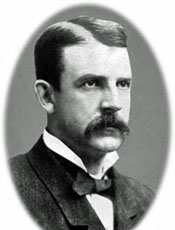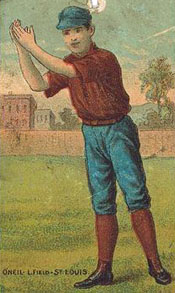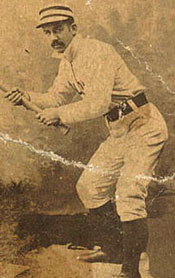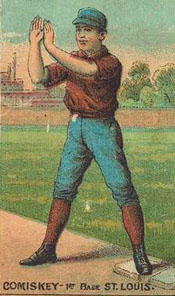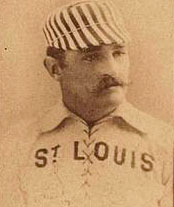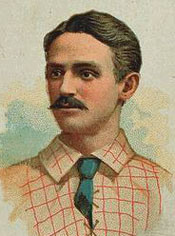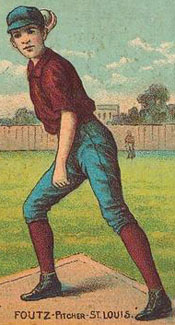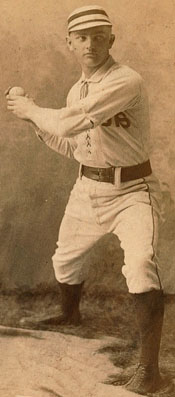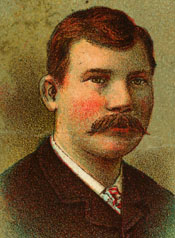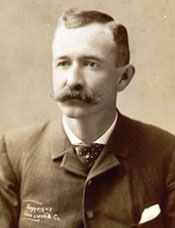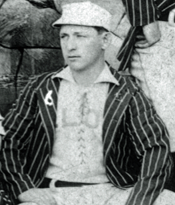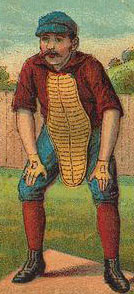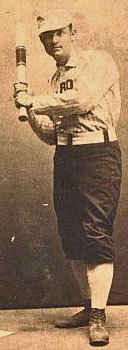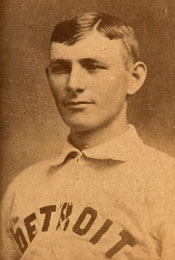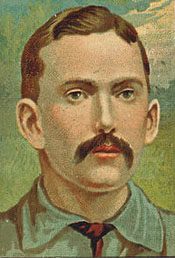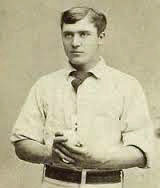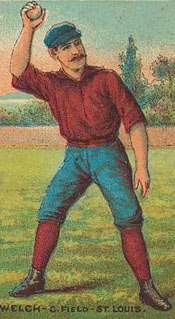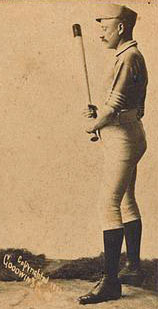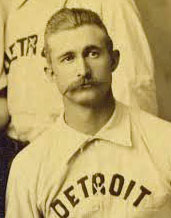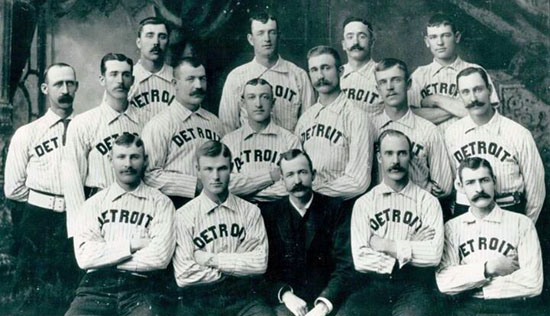|
|
The St. Louis Browns won the American Association championship four straight years from 1885 to 1888.
The Browns became the St. Louis Perfectos in 1899 and the Cardinals in 1900.
But his team's success was a source of irritation to Browns owner Chris Von der Ahe.
After the success of the 1886 "World Series," there was no doubt that the winners of the National League and American Association would again schedule a post-season series.
Monday, October 10: Game One at Sportsman's Park, St. Louis Tuesday, October 11: Game Two at Sportsman's Park, St. Louis Wednesday, October 12: Game Three at Recreation Park, Detroit The origin of Charlie Getzein's nickname is uncertain. Some sources say "Pretzels" was derived from his German ethnicity. Others say it came from his ability to throw a "double curve." Sporting Life described Charlie's unusual delivery of his pretzel pitch like this: "Getz" faced third base with one foot in either corner of the lower end of the box. Bending the left knee slightly, he draws his right arm well back. Then, straightening up quickly, he slides his left foot forward with a characteristic little skip, and, bringing hs arm around with a swift overhand swing, drives the ball in at a lively pace. St. Louis's only run scored in the 2nd when Robinson's pop fly fell safe when 2B Fred Dunlap and SS Jack Rowe looked at each other. The Wolverines tied the game in the 8th on a two-out wild throw and an infield hit that allowed the runner to score from 2nd when Comiskey threw low to 3rd. In the 13th, Getzein singled, then went to 2nd, and 3rd on outs. Rowe grounded to Robinson, but Comiskey muffed the throw to send the crowd of 8,000 into jubilation.
The teams boarded the train after the game for the overnight trip to Pittsburgh. Some Browns, including manager Comiskey, played poker into the wee hours. Yank Robinson and Curt Welch, both of whom had been drinking, got into a fistfight after one of the hands, and Welch ended up with a black and blue nose. 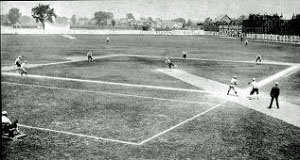
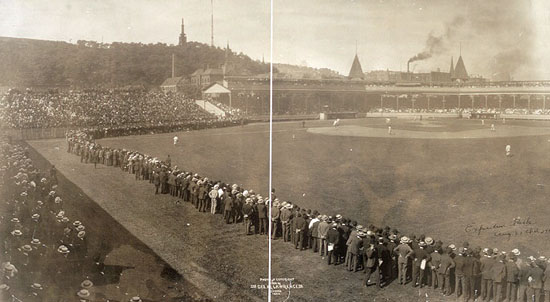 L: Recreation Park, Detroit; R: Recreation Park, Pittsburg
Thursday, October 13: Game Four at Recreation Park, Pittsburg [as that city's name was spelled at the time] A surprising number of 3,000 fans turned out to watch the Wolverines hand the Browns a sound 8-0 beating. St. Louis garnered only two hits off Charles "Lady" Baldwin while Detroit clubbed King for 17. The lackadaisical Browns committed six errors. Baldwin was given the nickname "Lady" because of his "quiet ways" and refusal to swear or use tobacco or liquor. Some Browns repeated the drinking and card playing on the train to New York City. The St. Louis Post-Dispatch reported: Comiskey stays up all hours playing poker with his men, and the majority of the club never knows what sleep means till 2 and 3 o'clock in the morning. Seven o'clock in the morning finds them awake at the poker tables again, and the loss of sleep, combined with the excitement of the game, shows itself in weak, nervous, sulky disposition and poor eyes when they begin to play ball. ... the Detroit players are as sober as judges, sleep ten hours to the night and play a strong game of ball. 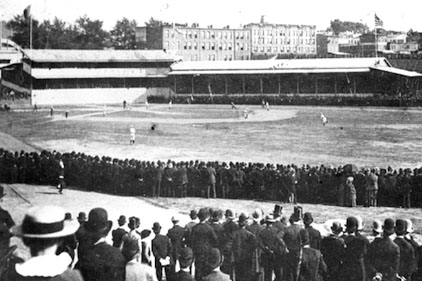 Washington Park, Brooklyn The first game in the East attracted "one of the largest audiences of the season" - estimated at 9,000 - in Brooklyn despite "fearfully cold" weather. For two hours before the 3 PM first pitch, crowded street cars dropped off passengers at the ballpark. The grand stand was packed; so were the open stands, while hundreds stood on the banks along the field or were stretched in a line across the ground behind the fielders. Perhaps inspired by the large crowd and the fact the Wolverines flew their championship flag in this National League park, the Browns ended Detroit's three-game winning streak, 5-2, behind Caruthers. St. Louis broke open a tie game with two in the 6th and one in the 7th. 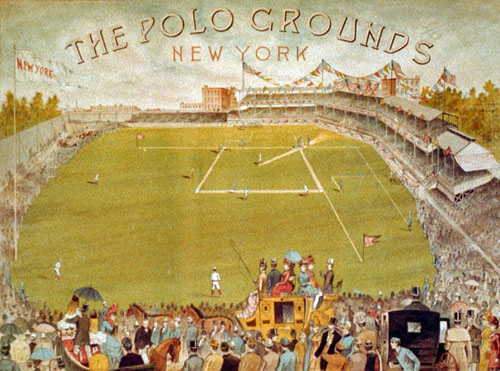
Polo Grounds, New York Moving to another borough ended the Browns' momentum as the Wolverines romped 9-0 before over 5,000 shivering spectators. There wasn't a vacant seat on either tier of the grand stand. On the "bleaching boards" seats were at a premium an hour before the game ... Along the picket fences and across the field was a long string of humanity ... Of course the ladies were there in full force. Hundreds of them sat on the grand stand and transformed it into a bower of beauty and color. They smiled sweetly at every good bit of fielding and applauded ecstatically at every smart hit. Pretzels must have had his curve working as he surrendered but two hits. Meanwhile, Detroit pounded Foutz so hard that they demoralized him. This circumstance so surprised him that toward the end of the game he lost his head and his nerve and tossed the ball over the plate in a way that showed he was indifferent to its fate. Sunday, October 16, was an off day for the World Series, but instead of giving his men a much needed rest, Von der Ahe scheduled an exhibition game against the Association's Brooklyn Grays at Ridgewood Park. Brooklyn won 10-3. Monday, October 17: Game Seven at Jefferson Street Grounds, Philadelphia The Browns played a competitive game, and Caruthers again pitched well. But Baldwin made three 2nd inning runs stand up. Lady gave up a lone run in the 9th on O'Neill's homer over the CF fence. The teams committed three errors between them, a low number in 1887. The Wolverines now led the series five games to two. Tuesday, October 18: Game Eight at Union Grounds, Boston Caruthers threw for the second day in a row with bad effect. Detroit coasted 9-2 behind Getzein before 4,000 fans. Sam Thompson cracked two round-trippers for the Wolverines. The Boston Herald reporter expressed disappointment over the performance of the St. Louisans. The Browns are the champions of the American association and this was their first appearance in Boston. They came to this city heralded as wonderful ball players. Latham, Comiskey, Welch, Caruthers and others have obtained a national reputation as among the most skillful exponents of the national game. With the reputation that had preceded them, the Boston public expected to see a team full of snap and dash and capable of fiving the leaguers a chance to hustle for victory. Listening to the general conversation among the spectators after the game, one quickly obtained the knowledge that a large majority of the spectators were disappointed at the exhibition given by the players from St. Louis. Latham called out his teammates after the game. That was no game we played today. The men were like a lot of amateurs in a vacant lot. I never saw them go on like that before. It made me sick. It disgusted me. It made me wish I was dead. We were a regular custard pudding for Detroit and they ate us without any sauce. We are not ballplayers, we are chumps.
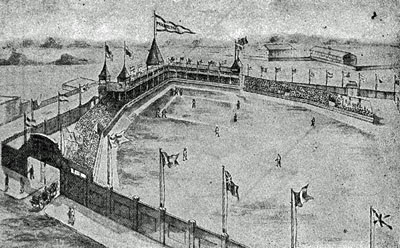
Jefferson Street Grounds, Philadelphia The game got off to a bad start for St. Louis. In the first inning Latham missed an opportunity to make first base by refushing to run on a bunted ball, which he thought was foul but which afterward rolled fair. The crowd got on him for this and guyed him unmercifully. The Browns took a 2-1 lead in the 6th but Detroit plated two in the seventh and one in the 8th to win 4-2 despite being outhit 9-6. The Wolverines needed only one more victory to clinch the series. 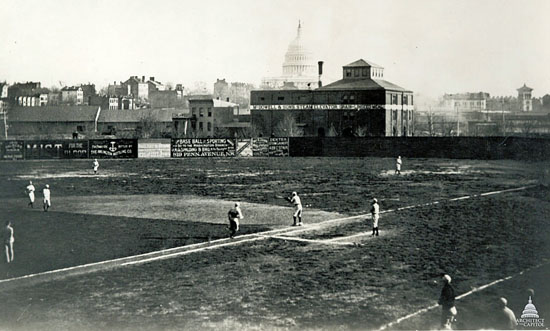 Swampoodle Groups, Washington D.C. Another good crowd, "between 3,000 and 4,000 people," saw the Browns pound out 19 hits off Getzein to romp 11-4 behind Caruthers. Comiskey's boys even pulled a triple play - SS Gleason to 3B Latham to 2B Robinson. St. Louis thus staved off elimination for another day. The game had been scheduled for the previous day but was postponed on account of rain. The grounds were in fair condition only. Friday, October 21: Game Eleven at Oriole Park, Baltimore The teams took the train to Baltimore following the morning game, arriving about 2 o'clock and immediately going to the grounds under police escort. The attendance was small (about 2,000) and the weather clear, but quite cold. The Wolverines pounded out 18 hits off Foutz to the Browns' four off Baldwin and a reliever to claim the championship 13-3. One report said, The Browns played like amateurs, while the League champions took advantage at every point, batted hard and ran the bases to perfection. Even though Baltimore was an Association city, the crowd rooted for the Detroiters and jeered the misplays of the Browns. Would Von der Ahe call off the rest of the series because Detroit had won eight games? Not on your life! He told the players they would get nothing if they did not finish out the remaining four-game tour. Saturday, October 22: Game Twelve at Washington Park, Brooklyn The Browns actually won the first of the meaningless exhibition games 5-1. It was exceedingly cold and the few spectators present (about 2,000) were kept constantly on the move in order to keep up circulation. The players seemed to be afraid of the ball and handled it very tenderly. Many plays were missed which, under ordinary circumstances, would have easily been accomplished. The game was mercifully called after seven innings. An article in the New York Herald claimed that the St. Louis and Detroit clubs would clear about $10,000 apiece on the world championship series - an enormous amount of money in 1887. Monday, October 24: Game Thirteen at Recreation Park, Detroit After traveling overnight, the two clubs arrived at the depot in Detroit where they were met by a large delegation of baseball "cranks" (as fans were called). A processing of carriages, headed by a band, was formed and the clubs escorted to the Russell House, where a public reception was held. About 4,000 people gathered for the game. Baldwin outpitched Caruthers 6-3. Afterwards, the teams attended a Banquet at Russell House before taking the train to Chicago. Tuesday, October 25: Game Fourteen at West Side Park, Chicago The Wolverines got only four hits but scored three in the first on two errors, a single, and a triple. Getzein made the runs stand up in the 4-3 victory. The day was so cold that the ice did not melt when the sun was shining, and only about four hundred cranks braved the rheumatism and kindred terrors to witness it. Wednesday, October 26: Game Fifteen at Sportsman's Park, St. Louis The Series finally ended before 800 spectators. The weather was cold, and the players were ready to quit at the conclusion of the sixth inning. At least those who showed up saw a victory for the hometown team, 9-2. That made the final tally 10 wins for Detroit, five for St. Louis. A sore loser, Von der Ahe told a reporter that his club had lost the championship of the world because the players were crippled by the hard work of the season. Mr. Von der Ahe thinks that if the St. Louis and Detroit teams should meet in the spring the now champions of the world would be defeated. It was bad enough that Chris refused to share any of the gate receipts with his players. He also reneged on his promise to pay each one the $100 he promised. That caused a rift between the owner and players that would never be repaired. Caruthers and Foutz were so disgusted they demanded to be traded. Von der Ahe obliged. He also sold off SS Gleason because of his poor performance in the post-season. St. Louis fans were outraged that Von der Ahe was dismantling their team. According to Comiskey, real estate losses were the real reason for his actions. The owner needed to reduce his payroll.
References: Before They Were Cardinals: Major League Baseball in Nineteenth-Century St. Louis, Jon David Cash (2002) The Spirit of St. Louis: A History of the St. Louis Cardinals and Browns, Peter Golenbock (2000) |
